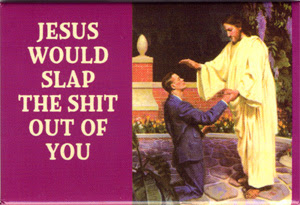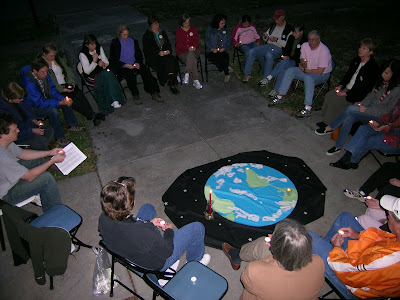Three years ago, in response to the
article I wrote for the local paper, many in my congregation raised some questions about the death of Jesus and what I thought it meant. I put together a little
question and answer essay. This is where I was three years ago. I think I have moved somewhat since then. Here is the beginning of that essay. The full essay is on my church's webpage.
Who killed Jesus?
Historical evidence suggests that he was executed on a Roman cross.
What was the motivation to kill Jesus?
Romans crucified to demonstrate their sovereignty. This is what happens to trouble-makers. Romans crucified to keep the peace; that is, peace through superior firepower.
Who else might have wanted Jesus dead?
The temple authorities, perhaps. Jesus was accused of blasphemy (perhaps warranted). He challenged the “brokering system” of religion by breaking religious laws. He did things for people (ie. forgive sins) that should only be done through proper channels.
Anyone else?
Disappointed zealots. In their view, Jesus did not come through as hoped and lead a revolt against Rome. He betrayed their cause.
And?
Bloodthirsty crowds. Stirred and caught up in a frenzy in a desire for violence, the crowds found their catharsis by cheering for execution of one who disappointed them.
Didn’t God want Jesus to die?
Now we are moving from history to theology, from the Jesus of history to the Christ of faith. In explaining the death of Jesus, the writers of the Gospels and the later tradition (that continues to this day) placed his execution under a divine plan. This is not atypical for storytelling (ie. the Joseph or Exodus story). We do this in telling our own stories. While it is important to move to faith, it is equally important to keep distinctions between faith and history.
In answer to your question, one could say that Jesus’ death was part of a divine plan.
So what was the plan?
The mystery of the divine plan for Jesus’ life, death and resurrection is to connect or re-connect humanity with God. How this connection/re-connection takes place has been conceived of in many different ways throughout the centuries. Here is one reason why we have so many different Christian denominations (and differences between Christians of one denomination). We don’t all agree on “the plan.” For the Reformed Church (which includes Presbyterians) we have not elevated one particular plan to the level of dogma. We keep the mystery of a variety of explanations. Here are three explanations of the Atonement:
Christ the Victor. This is believed by some to be the classical view of the early church fathers. Humanity is enslaved by the forces of evil and Christ is the ransom paid to the devil to free humanity from the devil’s clutches. In literature, this theory was illustrated by C.S. Lewis’ in The Chronicles of Narnia; the White Witch (Satan) slays Aslan (Christ) on the stone table, thereby freeing the inhabitants of Narnia.
Satisfaction. St. Anselm (1033-1109) created this theory that has become the dominant theory of Roman Catholicism and Evangelical Protestantism. The Fundamentalist movement has made this theory the cornerstone of its faith. Humankind has sinned and offended the honor of God. Humans must pay the debt to satisfy God’s honor. Humans cannot, only God can because the debt is infinite. So, God sends the God-Man who pays the debt and receives the penalty due humanity thereby satisfying the transaction. From Billy Graham to Billy Sunday, this view, or variations thereof, has influenced the American Protestant Church more than any other.
Moral Influence. Peter Abelard (1079-1142) gets credit for this theory, but claims few followers except for Liberal Protestants. Rather than to emphasize the transaction to satisfy God’s honor or to pay off the devil, Abelard viewed the problem of humankind’s estrangement as fear of God. God’s sacrificial love revealed in the life and passion of Christ, captures the heart and imagination and creates a change within. Rev. Dr. Martin Luther King emphasized this aspect of Christ’s action through his non-violent movement for civil rights. By non-violently resisting the oppressor while retaining human dignity, the oppressor’s heart can be moved to change.
Are these the only theories?
No. These might be viewed as the basic outlines. They have been modified, combined, and elaborated throughout Christian history and will continue to be so. Marcus Borg in his book The Heart of Christianity: Rediscovering a Life of Faith (HarperSanFrancisco, 2003) describes five different theories. I highly recommend this book.
Are these theories in the Bible?
Yes and no. It may be more accurate to say that the seeds or raw material for these theories can be found in scripture. But like all doctrines about God, Christ, sin, and salvation, atonement theories are part of a developing tradition. Because the sacrifice/satisfaction theory has been so pervasive in Evangelical Protestantism, it appears that it is the only theory. We tend to read the New Testament through its lens. (Read More)
Now I am not so sure about the crowds wanting Jesus dead. I don't think there was any "trial" at all. Pilate was ruthless. Josephus writes that Pilate executed without trial. Any who looked like trouble was put on the cross as an example. One can imagine that during the volatile Passover celebration, Rome would crucify a number of Jews as an example. The passion narratives in the gospels are retrojections of later theology (drawn from Psalm 22 and other places) back onto Jesus.
Also, I am not sure that I now can accept that the death of Jesus (or of anyone for that matter) is part of a "divine plan." At most, I can say that sometimes when human cruelty is exposed people can recognize that it is the wrong way to go and changes can occur. But this does not always happen. Further, to suggest that God wills or allows this cruelty so that some other good can arise is our human need to save God's honor. We would rather have a god that is cruel to us than to have none at all, or one that is powerless to stop cruelty and suffering.
Theories of atonement arise, I think, because we conceive of a god who is all-powerful. This god could stop cruelty and suffering if god wishes. So why doesn't god do so? In response to that question, humans have creatively invented theory upon theory to explain away god's inability to either care or to act.
But what if we conceived of god in a different way? What if we gave up the omnipotence of god and instead concentrated on the goodness of god? In this way of understanding god, cruelty and evil happens and god can do nothing about it. God is instead the choice within each of us to choose the good rather than the evil. The responsibility is ours. This is how I concluded my essay:
This is kind of confusing. What am I supposed to believe?
At one point in the Gospels, Jesus asks his disciples, “Who do you say that I am?” Perhaps we can appreciate this question as an invitation to the spiritual life. What does Jesus’ life and death mean to you? And what will you do about it?
But isn’t Jesus the same yesterday, today and forever? Shouldn’t there be one answer that stays the same?
Jesus and God may stay the same. But we change. The universe was probably pretty much the same 2000 years ago as today. But our conception of it has changed a great deal. The same might be said for Jesus and God. It does us little good to repeat old formulas and to parrot familiar explanations because they are old and familiar. We learn from our ancestors. We are guided by them. We are foolish to ignore them. But we are not them. Each generation needs to struggle anew with the question Jesus put before his disciples, who do you say that I am?
All right, then. Who do you say that Jesus is? Can I ask you that?
Sure. First a couple of disclaimers. My faith is a work in progress. I have not arrived. Also, just because I interpret the mystery in one way, doesn’t mean you have to do so in the same way, or that I am “right.” Language that is meaningful for one person may not be for another. Finally, I prefer a variety of images. Some are more meaningful at certain times in my life or in certain situations I am facing.
All that said, here is where I am at this point regarding Jesus:
I believe that Jesus points to God. The God to whom Jesus points is not up there or out there but within and among all things at once like the air we breathe. Sadly, I do not pay enough attention to God. I get caught up in lesser things. I worry too much about things I cannot fix. I want to preserve my life and to defend my ego. I worry about stuff. Yet God calls me to a new way of living. When I least expect it, from those whom I would rather not expect it, God surprises me. Jesus was filled with surprises. His parables are profound surprises. He showed me that I have power, that life is more complex and beautiful than any system, and that the act of loving my enemy is the key to my salvation.
I believe in something Jesus called “the kingdom of God.” He showed us glimpses of this kingdom through his deeds and words. The kingdom of God spoke about how we are to live in response to possessions, outsiders, the enemy and violence.
In God’s kingdom, here is how we are to respond to money.
We need to give it away.
To outsiders. We need to make them family.
To enemies. We need to care for them.
To violence. We need to die.
I believe that grace, unfettered access to God, is for everyone. That experience of grace is powerful beyond belief. As we connect with God’s grace through worship, study, mission, justice-making, community, and prayer we are given the courage and joy to live with integrity.
Jesus showed us that living with integrity could get you killed.
But you are going to die anyway, so you might as well die for love, justice, peace and dignity and for your neighbor. The mystery of the Resurrection is that this way of living is worth it.
I believe the only hope for humanity is to follow his path of non-violent love.
I wish I had more faith to trust in Jesus’ vision.
No More Crosses,
John






























